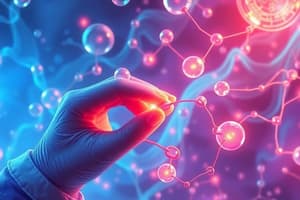Podcast
Questions and Answers
Pharmacokinetics refers to the study of the effects of drugs on the body.
Pharmacokinetics refers to the study of the effects of drugs on the body.
False (B)
Drug distribution involves sending the drug to different parts of the body.
Drug distribution involves sending the drug to different parts of the body.
True (A)
Excretion is the process of breaking down drugs in the body.
Excretion is the process of breaking down drugs in the body.
False (B)
Enteral routes of drug administration include intravenous and intramuscular methods.
Enteral routes of drug administration include intravenous and intramuscular methods.
Acidic drugs mainly bind to albumin.
Acidic drugs mainly bind to albumin.
Pharmacodynamics focuses on the effect of the body on drugs.
Pharmacodynamics focuses on the effect of the body on drugs.
Basic drugs bind mainly to beta-acid glycoprotein.
Basic drugs bind mainly to beta-acid glycoprotein.
The intestinal epithelium is a barrier that drugs must pass through during drug administration.
The intestinal epithelium is a barrier that drugs must pass through during drug administration.
Only the free and unbound fraction of a drug is available for action, metabolism, and excretion.
Only the free and unbound fraction of a drug is available for action, metabolism, and excretion.
Protein binding shortens the duration of action of a drug.
Protein binding shortens the duration of action of a drug.
The blood-brain barrier serves as a protective barrier for the brain.
The blood-brain barrier serves as a protective barrier for the brain.
Placental barrier allows lipid insoluble drugs to cross easily.
Placental barrier allows lipid insoluble drugs to cross easily.
Topical administration involves delivering drugs directly into the bloodstream.
Topical administration involves delivering drugs directly into the bloodstream.
First pass metabolism refers to the metabolism of a drug during its journey from the site of absorption to the systemic circulation.
First pass metabolism refers to the metabolism of a drug during its journey from the site of absorption to the systemic circulation.
Drugs given orally bypass first pass metabolism.
Drugs given orally bypass first pass metabolism.
Bioavailability is the fraction of a drug that reaches the blood circulation following administration by any route.
Bioavailability is the fraction of a drug that reaches the blood circulation following administration by any route.
The route of administration does not impact a drug's bioavailability.
The route of administration does not impact a drug's bioavailability.
Absorption is important for all routes of drug administration, including the IV route.
Absorption is important for all routes of drug administration, including the IV route.
Distribution is the process of breaking down drugs in the body.
Distribution is the process of breaking down drugs in the body.
Absorption is the entry of drugs into the bloodstream.
Absorption is the entry of drugs into the bloodstream.
Bioavailability refers to the fraction of a drug that reaches the blood circulation following administration by any route.
Bioavailability refers to the fraction of a drug that reaches the blood circulation following administration by any route.
Parenteral administration refers to drug administration routes that involve the digestive tract.
Parenteral administration refers to drug administration routes that involve the digestive tract.
Pharmacodynamics focuses on the effects of drugs on the body and their mechanism of action.
Pharmacodynamics focuses on the effects of drugs on the body and their mechanism of action.
First pass metabolism is more common in enteral routes of drug administration than in parenteral routes.
First pass metabolism is more common in enteral routes of drug administration than in parenteral routes.
Plasma protein binding affects the rate and extent of drug distribution.
Plasma protein binding affects the rate and extent of drug distribution.
Basic drugs primarily bind to albumin in plasma.
Basic drugs primarily bind to albumin in plasma.
The blood-brain barrier allows all drugs to freely cross into the brain.
The blood-brain barrier allows all drugs to freely cross into the brain.
During inflammation of the meninges, the blood-brain barrier becomes impermeable to drugs.
During inflammation of the meninges, the blood-brain barrier becomes impermeable to drugs.
Lipid-soluble, unionized drugs easily cross the placental barrier.
Lipid-soluble, unionized drugs easily cross the placental barrier.
The volume of distribution describes how extensively a drug is distributed compared to urine.
The volume of distribution describes how extensively a drug is distributed compared to urine.
Topical administration involves delivering drugs directly into the bloodstream.
Topical administration involves delivering drugs directly into the bloodstream.
Bioavailability of a drug is always 100% when administered intravenously.
Bioavailability of a drug is always 100% when administered intravenously.
First pass metabolism occurs during a drug's journey from the site of absorption to systemic circulation.
First pass metabolism occurs during a drug's journey from the site of absorption to systemic circulation.
Drugs given orally may undergo metabolism in the gut wall and liver before reaching systemic circulation.
Drugs given orally may undergo metabolism in the gut wall and liver before reaching systemic circulation.
Enterohepatic circulation involves the movement of drugs from the liver to the kidneys for excretion.
Enterohepatic circulation involves the movement of drugs from the liver to the kidneys for excretion.
Drug distribution is the process of dispersing drugs from other tissues to the systemic circulation.
Drug distribution is the process of dispersing drugs from other tissues to the systemic circulation.



